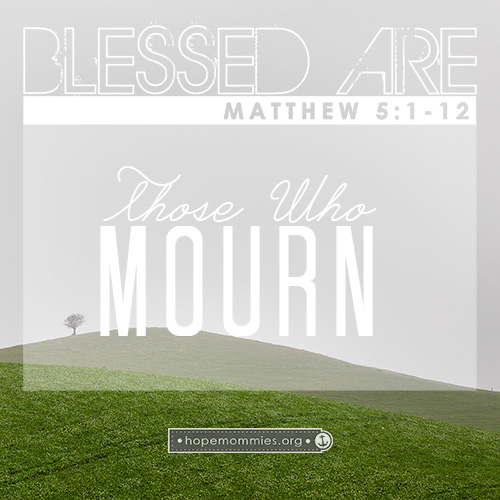Blessed Are Those Who Mourn
 Grieving the loss of a child has a way of creating an urgent desire for solid, biblical answers for any theological questions that arise in the heart—what has God truly said in His Word about why this kind of pain exists in the world?
Grieving the loss of a child has a way of creating an urgent desire for solid, biblical answers for any theological questions that arise in the heart—what has God truly said in His Word about why this kind of pain exists in the world?
When this world feels devoid due to child loss, one’s attention can be well set upon knowing how to hope for another world. Hope is needed because all is not right. This cannot be it for us as people. The Christian hope, such a blessed hope, tells us that there is more to know than what only experiences can tell us.
Understanding what hope God gives can come through observing what kind of mourning Jesus speaks of: “Blessed are those who mourn, for they will be comforted” (Matthew 5:4). Not all causes of mourning are the same. One might mourn for the good that has not been given to her by God, but has perhaps been given to another. It is self-defeating because our help is not found in longingly looking at the lives of others with hearts that will only be happy with what others possess; this is not a blessed kind of mourning. Another cause of mourning is for the loss of a person; this is the earthly loss of a good gift (or gifts) given by God.
I trust Jesus’ own tears to validate mine in this (John 11:33-35). There is yet another kind of mourning in Scripture—spiritual mourning. This is to mourn over sins. Because Jesus Christ is the One who redeems me from my sins, biblical hope—first and foremost—is the hope of no longer being held by sin, by its presence, power, and punishment.
This is the kind of mourning Jesus primarily speaks of in Matthew 5:4.¹ So it stands to follow that if I do not first understand sin, I cannot understand biblical hope. The pieces of my heart shattered in grief—I have felt as though I hardly had one left. And in grief, my theology felt more disheveled than ever—with many different assumptions about God and His character surfacing.
It has been likely challenging, to say the least, to sort through it all. And I am still sorting. That is why, today, I want to give those who are grieving one bottom line. I do not think it is all of the truth that you will need in your grief. But it is needed, and it is a brief theology of sin’s beginnings in this world—and sin’s relationship to death and hope.
Spiritual death came in the garden of Eden when the decision was made to sin. The human race fell from the glory of the presence of God, and death was introduced. Mankind is now still graciously given opportunity to know God and live in the glory of His presence one day—but a Savior has been needed because the first spiritual death precipitates a death of conscious eternity in the lake of fire, as Jesus teaches through His Word (Matthew 25:46; 2 Thessalonians 1:8-9; Revelation 20:13-15).
No mere human can avoid it of his or her own merit. All people need to be rescued from sin this day, and from this future of punishment.
Maybe you have never mourned for your sins or seen your need for a Savior. Perhaps you have experienced this plunging grief, mourning the loss of your dear baby, and that made you interested in the things of God and the Bible for the first time, or the first time in a long time. And maybe that is when you found this post.
You, dear mom, need to know that the Bible teaches that true, biblical hope can only be known by those who have spiritually mourned (though this is perhaps the first time you have heard it called that). You also need to know that you can truly have hope. Our separation from God in present sin and future punishment is something that He has told us how to avoid. The grief that we experience when a child goes ahead is a loud cry, impaling the heart with the truth that something is not right—and at the root, what isn’t right in this world is sin, the original initiator of death.
Let me pause for a moment here; I understand it might be difficult to hear that statement if you are grieving the loss of a child because you might initially think I mean that I suspect a specific sin in your life led to the death of your child. After the experience of loss, the mind so deeply wants to have understanding about the cause of death that it filters what it hears through those terms—yet often times, this kind of understanding about the workings of this world is one that mere man cannot have (Job 38).
But I am writing at this point about a theological understanding of sin—the bigger picture that applies to all of us. Death is not a part of God’s good plan for eternity, He mourns with us, and He is not glad we experience it; at the same time, what God indicated in the garden was true (Read Genesis 1-3).
It is impossible for us to live, to be full, to be satisfied, to be whole, to be home, to have joy, to love, etc., without God. He knew it. It could be no other way for His creatures; He is God and we are, rightly, His—and only right ourselves when we are living in obedience to Him. Most importantly, there is no way for God to be glorified as He deserves in this world without Him being truly God to all of His people and creation. In the garden, He gave us good commandments. He told us that we would assuredly not fare well without Him—that we would surely die, that because He is God it could be no other way.
He told us that, as He is the only God, He merits our submission and obedience. Asserting oneself as “god” ultimately ends in impossibility because there is only One. But mankind desired independent goodness and power. While self-sustaining power and self-created goodness are only myths, they are influential myths—and Adam and Eve believed them.
And so many in our day believe them too; how prevalent is the thinking that we can each do our own “good” as we please, and pursue our own path to happiness—a power-grab—and end up in heaven! But in reality, all people are accountable to a holy God who knew there could be no good for created beings without their Creator—and who is righteous and holy such that to disregard Him in following one’s own path is considered sin that cannot stand before the God.
So mankind died spiritually, and physical death was introduced into the human experience. By God’s mercy, grace, and patience, mankind did not go to the lake of fire immediately. By His great mercy, He allowed mankind to live in a fallen—yet redeemable—world and have opportunity to turn from sinful ways to a Redeemer. Living on this fallen earth while still having an opportunity for repentance was very gracious of God.
For, having opportunity to turn to God on this earth means this does not have to be our state, our experience, our “it” forever! There is an escape from this fallen place, and even more, from the lake of fire, which is far worse.
Now dear moms, let me tell you about the good news in which I believe” “Now, I would remind you, brothers, of the gospel I preached to you, which you received, in which you stand, and by which you are being saved, if you hold fast to the word I preached to you—unless you believed in vain. For I delivered to you as of first importance what I also received that Christ died for our sins in accordance with the Scriptures, the He was buried, that He was raised on the third day in accordance with the Scriptures, and that He appeared to Cephas, then to the twelve” (1 Corinthians 15:1-5).
There is a Substitute, One who died to save sinners! When I mourn because I see me sin for what it is before God, and turn from it to trust in Christ as my Savior and Master for forgiveness—trusting His life, death, and resurrection and appearances that tell me that He, the Substitute, is alive—I become dead to my sin and raised to life, back into good submission to Christ my Lord. And I gain eternal salvation, the promise of God’s future glorious presence, and a present hope in my grief. You can turn from sin and gain Christ too.
Jesus’ words are the comfort for the spiritually mourning soul—for they are from Someone who has the complete authority to say—“your sins are forgiven!” (Matthew 9:2; Luke 7:48; Mark 2:5) In the end, no other “hope” will matter but this kind. So, please do not let anyone tell you that you can have the hope of God if you have not put your faith in the Substitute—if you have not first spiritually mourned before the blessed face of a dear Savior who loves you enough to sacrifice Himself to death for the punishment of your sins, enabling spiritual death and eternal punishment to be replaced with eternal life.
Your hope, whether you are heavily grieving a recent loss or whether you are years down the road, is found through the resurrected Lord who holds life in His good hands. Knowing these truths, I am able to believe, even in my cutting and overwhelming grief, tears, and pain, that I am truly blessed and comforted by God. For He has saved me from my worst future freely and completely through Jesus Christ. My sins have been forgiven—of no merit or work of my own—granting me hope eternal, restoration to Him forever: “Blessed are those who mourn, for they will be comforted,” (Matthew 5:4). Better news the world has never known.
- Lianna
Hope Mom to Noelle

Lianna is author of Made for a Different Land: Eternal Hope for Baby Loss (Hope Mommies, 2019). More of her writing can be found at her website.
We would be honored to share your story as a Hope Mom on our blog. On Saturdays we feature Hope Moms’ stories in order to showcase God’s faithfulness even in the midst of such deep sorrow. If you would like to have your story shared on our blog for this purpose, learn more and submit here.
Widget not in any sidebars


Got something to say?